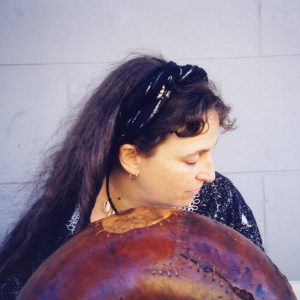In Zimbabwe, the healing power of mbira is considered to be derived from two interconnected sources: the power of mbira to connect the living with the departed (the ancestor spirits), and the intrinsic power of mbira’s sound.
As Shona mbira music spreads around the world, its power to heal cross-culturally appears to be universal, from banishing a stress headache to quick healing from surgeries. While the healing effect is most powerful with live mbira music, a good traditional mbira recording also works well.
How Does Mbira Heal? – Shona Perspective
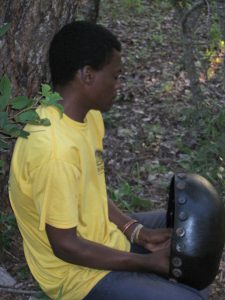
Chaka Chawasarira notes that it is mysterious how mbira heals – it enters your heart and your mind, puts you in a trance where you are in your spirit self. Your thoughts and worries are gone and your body can heal. The sound of mbira will affect you with or without your belief in its healing power. “There is no music as sacred and touching as mbira – it is not the instrument of the living, but the instrument of the departed.”
The Shona belief is that mbira music can cause immediate improvement in health by itself; however, for a long-term cure one must often look to a problem among the ancestor spirits. A grandfather’s spirit who wants his name given to the sick child. The ngozi (revengeful spirit) of a neighbor who was killed by a deceased relative of the sick man. When this type of problem is resolved, and all is harmonious between the both the living and the spirits, long term health is assured for the patient.
Mbira music is essential here, because it is the “telephone to the spirits”, as one musician describes – an essential part of the method the living use to contact the ancestors.
Individual Shona musicians’ perspectives on mbira and healing are presented later on this page.
How does Mbira Heal? – Western Music Therapy Perspective
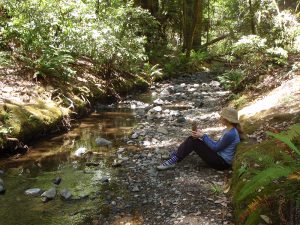
In the 1990’s, California music therapist Robert Heirendt found mbira to be dramatically effective in treating patients with autism or thought disorders such as schizophrenia. The reasons he describes for mbira’s effectiveness are relevant to anyone, not only those suffering from extreme conditions.
The regular, consistent rhythm of mbira results in ‘rhythmic entrainment,’ in which body rhythms align themselves with the rhythms of various of the intertwined melodies in the music. Heart rate, respiration rate, the firing of neurons in the nervous sytem, and other rhythms of the body’s physical functioning can be positively affected.
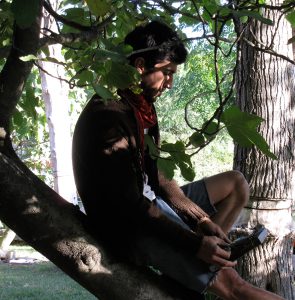
The repetition and predictability of the mbira rhythms and melodies help the mind to leave analytical thought patterns. This can be comforting and grounding, improving the listener’s mental and emotional state.
How Does Mbira Heal? – Universal Perspective
Mbira music is circular in form. As the fundamental melodic and rhythmic cycle of an mbira song repeats, around and around the circle, it draws musician and listeners into a state of meditation. In this state, thoughts and emotions and their associated tension drop away. The resulting state of deep peace allows the mind and body to heal naturally. A feeling of deep relaxation often occurs together with a feeling of being energized. When tension is absent, one’s natural vitality and life force can be felt.
These effects cross cultural boundaries and can be felt universally.
Reports from Shona Musicians
In 1999, elder mbira masters Chaka Chawasarira, Ambuya Beauler Dyoko, Cosmas Magaya and Hakurotwi Mude, and hosho (rattles) player Simon Magaya, discussed with Erica Azim numerous examples where they had personally witnessed or experienced healing with mbira. A few of these are described below.
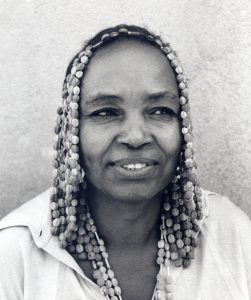
Ambuya Beauler Dyoko
The late Ambuya Beauler Dyoko, a n’anga (traditional healer), reported that playing mbira for a patient before a healing session calmed the patient and gave confidence in the treatment prescribed. The patient’s favorite song, if in the ancient traditional repertoire, was very effective for this.
Simon Magaya
Simon Magaya described the cure of an illness caused by ngozi (an avenging spirit). Ngozi can cause illness if, for example, a man hit his mother long ago during her lifetime. When he falls ill, Western-trained doctors are not able to cure him.
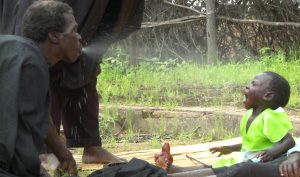
A n’anga (traditional healer) is then consulted, who exposes the problem of the mother’s aggrieved spirit. The patient must go through the village confessing his crime and letting everyone scold and scorn him, also collecting grain from them in a sack. He then must pay several cattle as a fine to the mother’s surviving relatives, brew beer from the collected grain, and hold a ceremony with mbira players.
The music of the mbira calls the wronged mother’s spirit. The mother’s blood relative explains to the spirit all that has been done to atone for, and pay for, the original crime, and then asks the spirit to stop causing the illness. The patient is now healthy immediately following the ceremony.
Note that harmony between both the living and the deceased of the two families is the desired goal, which leads to health.
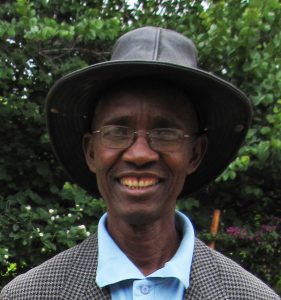
Chaka Chawasarira
Chaka Chawasarira explained how mbira is used in Zimbabwe to cure mental illness.
“When a mentally disturbed person comes to a ceremony where mbira is being played, he will go wild for a while. Then he sits down, calms down and listens to the mbira. If you talk to him, he will be quite reasonable. After each time he comes to hear mbira, he will be much improved, until, after several times, he will often be completely cured.”
Cosmas Magaya
Cosmas Magaya reported that one of his American mbira students recovered from a serious heart condition through mbira. Magaya advised his student to sit alone in a quiet place each day and play mbira. After following this advice, the heart problem was controlled.
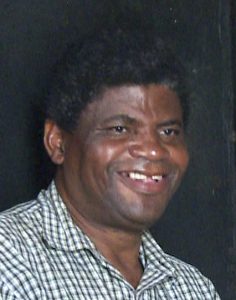
Emphasizing that mbira music can remedy any stressful situation that might be affecting mental and physical health, Magaya noted that after playing mbira or listening to mbira for a while, one always feels much better.
Cosmas Magaya also reported that, especially in Zimbabwe’s rural areas, mbira music is often played at the beginning of a healing session with a n’anga (traditional healer). This not only calms the patient, but draws all the spirits near, including any that might be offended and needing appeasement. Then the n’anga will say “This spirit so and so is complaining. He is here because mbira has been played”. After which, the n’anga (actually the spirit through the n’anga) will explain what must be done to resolve the problem.
Magaya gave an example of a common problem in Shona families, where a spirit can cause illness in a young child (around 10 years old) that cannot be cured by Western medicine. A brother, or other relative, who has died wants the child to be given his/her name – the spirit makes the child ill to get the family’s attention. When doctors fail to cure the child’s illness and a n’anga is consulted, mbira is played, and the spirit explains the naming requirement.
The family now has to prepare traditional millet beer for seven days, and relatives are called to come to the ceremony. At the ceremony, mbira is played to call the spirit, and special things are done. The patient will have some knots tied on his hands.
One of the most senior elders talks to the ancestral spirit, naming the child saying, “Today we have accepted your demands. We are giving your name to this individual. From today we would like to see some changes in this person. If it is you who has been giving problems, show us that you are the one. If we don’t see an improvement now, then we will know that is not it.” Magaya stated “In most cases we have found that without any medication, this child recovers immediately after the ceremony.” He noted that mbira pieces appropriate for this ceremony include the old style of Bangidza and Nhema musasa yepasi.
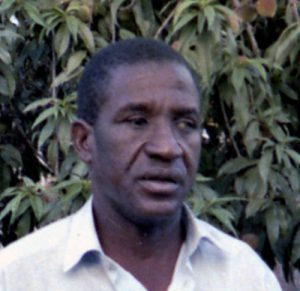
Hakurotwi Mude
The late Hakurotwi Mude, a renowned mbira singer, noted that his singing could increase the healing power of the mbira, but that singing alone without mbira is not effective. He emphasized that it is the mbira music which is required for healing.
Which mbira piece? Played how?
These five Shona musicians agreed that any piece from the ancient Shona mbira repertoire, in any traditional tuning, can be healing – if played well, traditionally, and with serious intention. Playing around casually on the mbira instrument would not do the job. Playing should be flowing, but not too fast or too slow. If the patient has a favorite mbira piece(s), that will be most effective.
Erica Azim reports on mbira healing outside Zimbabwe

People are being healed by mbira in the Western world, too. I have been very touched by reports of my mbira albums being taken into surgeries, births, massage sessions, road trips (“the kids never fight in the back seat when your music is on”), etc.
Most moving was a man who came up to me at the Zimbabwe Music Festival (held in the western US) many years ago. He told me that he had come to the festival just to meet me, and thank me, because he had only survived years of a serious illness by listening to my first CD Mbira Dreams all night, every night, during those years. This is why mbira players must always be humble (a rule in Shona culture), as a human being cannot have that kind of power – this is the healing power of the ancestors. A gwenyambira (professional mbira player) is merely a tool of the spirits.
I have also listened to mbira during surgeries myself, and healed amazingly fast. I recommend getting a small mp3 player (cheap just in case it gets lost), and listening to mbira the whole time one is in the hospital, even while unconscious during surgery. You can start listening before you even go to the hospital, even for days, to prevent (or reduce) stress about the upcoming procedure. And then keep listening at home during your recovery.

